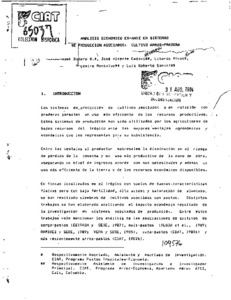Mission
To reduce hunger and poverty, and improve human nutrition in the tropics through research aimed at increasing the eco-efficiency of agriculture.
People
CIAT’s staff includes about 200 scientists. Supported by a wide array of donors, the Center collaborates with hundreds of partners to conduct high-quality research and translate the results into development impact. A Board of Trustees provides oversight of CIAT’s research and financial management.
Values
- Shared organizational ethic
- We respect each other, our partners, and the people who benefit from our work. We act with honesty, integrity, transparency, and environmental responsibility in all of our joint endeavors.
- Learning through partnerships
- We work efficiently and pragmatically together and with partners. Considering our diversity to be a key asset, we adapt readily to change and strive to improve our performance through continuous learning.
- Innovation for impact
- We develop innovative solutions to important challenges in tropical agriculture, resulting in major benefits for the people who support, participate in, and profit from our work.
Members:
Resources
Displaying 796 - 800 of 958Aspectos económicos del arroz en Ecuador
Análisis económico ex-ante en sistemas de producción asociados: cultivo arroz-pradera
A geographical information approach for stratifying tropical Latin America to identify research problems and opportunities in sustainable agriculture
Over the last 12 years a data base of climate, soils and crop distribution has been assembled for Latin America. Recently, socio-economic variables such as access and populations density and environmental variables such as the location of national parks, biological reserves and indian reserves have been added. Formerly this information was used primarily to make decisions on commodity research.
El ambiente socio-economico de la produccion de raices y tuberculos: implicaciones para el diagnostico
Using the farm as unit of analysis, diagnosis processes aimed at improving production systems are reviewed. Within a country, diagnosis should be conducted at different hierarchical levels: local (interaction between the production system and the input distribution sector, the marketing sector, possible forms of processing, and consumption characteristics); regional (appropriate selection of target site); and national (development trends and governmental policies at the macroeconomic and sectorial levels).



